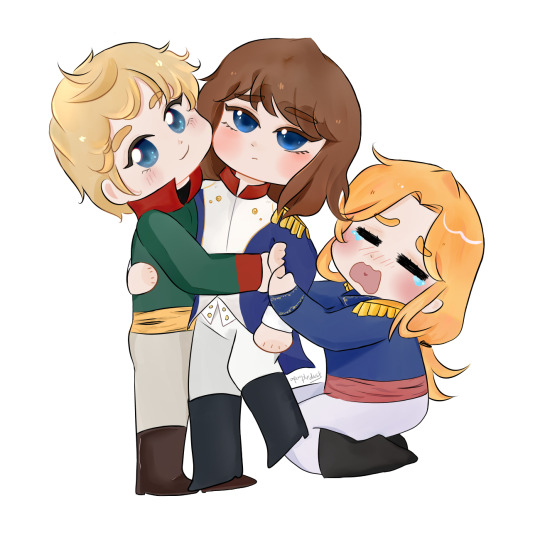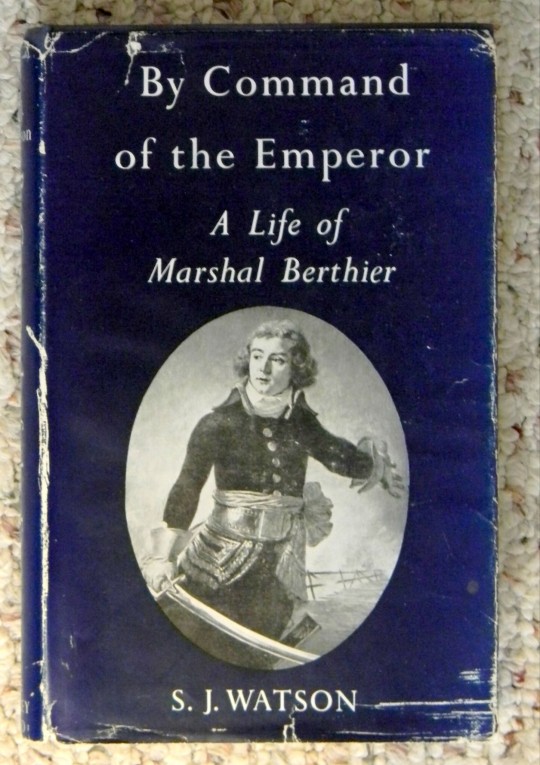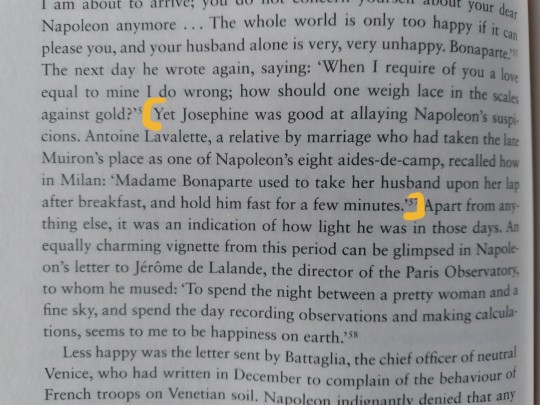#the life of Napoleon Bonaparte
Text
Napoleon being tired out by age:
“I attended the Weimar ball. The Emperor Alexander dances, but I don't; forty years are forty years.”
— Letter to Josephine, 9 October 1808

Source: The Life of Napoleon Bonaparte, John S. C. Abbott, Volume III
#was he even 40 yet in 1808?#I think he was 39#anyway there definitely was a decline in his health from age 40#John S. C. Abbott#the life of Napoleon Bonaparte#Napoleon#Josephine#josephine bonaparte#napoleon bonaparte#tsar Alexander#letter#book#book pic#napoleonic era#napoleonic#quotes#history#first french empire#Weimar#french empire#19th century#France
73 notes
·
View notes
Text

#How to Tell if Napoleon is in Your Living Room#tips#tricks#life hacks#helpful hints#advice#Napoleon Bonaparte#Napoleon#France#history#unreality
1K notes
·
View notes
Quote
Ability is nothing without opportunity.
Napoleon Bonaparte
#Napoleon Bonaparte#motivation#quotes#poetry#literature#relationship quotes#writing#original#words#love#relationship#thoughts#lit#prose#spilled ink#inspiring quotes#life quotes#quoteoftheday#love quotes#poem#aesthetic
139 notes
·
View notes
Text

trying to break my art block by drawing napalexjuno (alexnapjuno??)!!😭 @etsu-silly and @goddammitjosef I DID IT 😭
#napoleon#napoleon bonaparte#jean andoche junot#alexander i of russia#tsar alexander i#first time drawing alexander in my life#i hope it looks like him💀#my art
111 notes
·
View notes
Quote
Ability is nothing without opportunity.
Napoleon Bonaparte
#Napoleon Bonaparte#motivation#quotes#poetry#literature#relationship quotes#writing#original#words#love#relationship#thoughts#lit#prose#spilled ink#inspiring quotes#life quotes#quoteoftheday#love quotes#poem#aesthetic
88 notes
·
View notes
Text
The reason most people fail instead of succeed is they trade what they want most for what they want at the moment.
– Napoleon Bonaparte
115 notes
·
View notes
Quote
Ability is nothing without opportunity.
Napoleon Bonaparte
#Napoleon Bonaparte#motivation#quotes#poetry#literature#relationship quotes#writing#original#words#love#relationship#thoughts#lit#prose#spilled ink#inspiring quotes#life quotes#quoteoftheday#love quotes#poem#aesthetic
431 notes
·
View notes
Text
*BOOK REPORT*
By Command of the Emperor, by SJ Watson


(my copy is plain and blue, but I'm guessing it once had a book jacket like the one on the right)
I initially did not know very much about Marshal Berthier but through @gabrielferaud I began to learn of the abuse he endured from Napoleon and I remembered I had this book.
I was surprised to learn that Berthier was 16 years older than our Emperor, and already had an accomplished life before Napoleon came into the picture.
In 1779,
Alexandre was now twenty-six years old. He had served as a topographical engineer, as a lieutenant in the infantry, and as a cavalry captain; and he was now on the personal staff of an army commander.
By the next year, he was serving overseas under General Rochambeau in the American Revolution alongside Washington and La Fayette! After three years in America, he returned to France.
And so Berthier - a cadet at the age of twelve, a general at thirty-nine and a private at forty - quietly resigned himself to the end of his military career, the more so because he had never held any personal ambitions other than to do his best.
Berthier would have been better off if he had retired at forty and had never met Napoleon Bonaparte. He would have disappeared into obscurity, but fate would have different plans. Alternately, Napoleon was very lucky to have found Berthier. I'm going to go out on a limb and say without Berthier, Napoleon wouldn't have been anywhere near as successful as he was. Yes, he was a great general, a great leader, a genius, but he needed someone who could understand his intentions and make sure his plans were executed with precision. That man was Alexandre Berthier.
For 18 years, Berthier served Napoleon. He was the chief of staff and the first to be made a Marshal of France under Napoleon. He endured Napoleon's temper and unjust scorn. Napoleon called him, "Uninteresting" and "no good" and "in the way". Napoleon hardly ever let Berthier take credit for his success but was quick to blame his own faults on Berthier. But Berthier was loyal through and through. When warned of Napoleon's temper early on, he said, "But remember that one day it will be a fine thing to be second to that man."
It was a very good book with only two things I thought were odd. 1) Napoleon forced Berthier to marry and it was later mentioned that he had two young sons. Nothing was mentioned about his wife being pregnant or the birth of his sons, or even their names. 2) Berthier died from a fall out of a window. The book implied that he was dizzy and fell out or that Caulaincourt (his friend!) had him murdered. I think he either fell or jumped on his own. I don't think anyone - especially Caulaincourt - had anything to do with it.
But all in all, it was a very good and informative book. I learned a lot about Marshal Berthier and saw another side of Napoleon that I am not used to seeing. Like with most books that aren't a general biography of Napoleon, I would definitely suggest having some background knowledge as things that are going on are not always explained fully.
#berthier#marshal berthier#louis alexandre berthier#alexandre berthier#by command of the emperor#a life of Marshal Berthier#sj Watson#book report#Napoleon#napoleon bonaparte
52 notes
·
View notes
Text
So I am reading this novel about Naps and Josephine's story and his passion has already worn out in Italy, so his whole great love for here is also over by consequence. An idea is worth loving, not a human woman. He's already ogling Giuseppina Grassini. (Btw funny how his first serious mistress's name was the same he gave to his wife).
I'm bothered when they come to picture this as the ending of all Napoleon's love for Josephine. Mostly in fiction, but even non-fiction tends to give this interpretation of their dynamic, sometimes already during the Italian campaign.
(I should point that this is an old novel, though.)
Why should any feeling of love go away once most passion and enthusiasm is over? The "mio dolce amor" period seems to me as just one phase of a much more complex relationship. I'd rather see it like Napoleon matured out of an excessive enthusiasm, stopped idealising her wife and gave her a more balanced vision and sentiment. He certainly had to do this after facing her faults, maybe also suffering while doing so, but should that not be love too?
He must have stopped worshipping a divinity and begun comprehending a woman, and that should be framed more as a positive thing, not as a delusion.
#Oh hey that's me rambling about Napoleon and Josephine#How new#Well that's the reason I called myself napology down here#Hashtags beginning with Capital letters#napoleon bonaparte#Napoleon Bonaparte#Josephine Bonaparte#Napoleon and Josephine#Passion is not the only face of love#It should be normal but it's not stretched out enough#End of the rant bye#Love#Passion#In the end I use them and their story to think about problems and topics in real life#i like translating topics like that#For me it's the final sense to give to everything
39 notes
·
View notes
Quote
Ability is nothing without opportunity.
Napoleon Bonaparte
#Napoleon Bonaparte#motivation#quotes#poetry#literature#relationship quotes#writing#original#words#love#relationship#thoughts#lit#prose#spilled ink#inspiring quotes#life quotes#quoteoftheday#love quotes#poem#aesthetic
105 notes
·
View notes
Text
Hostile historians have stigmatized him as a usurper, while admitting that the suffrages of the nation placed him on the throne, they have denounced him a tyrant inexorable as Nero, while admitting that he won the adoring love of his subjects, he is called a bloodthirsty monster, delighting in war, yet it is confessed that he was, in almost every conflict, struggling in self-defense and imploring peace, it is said that his insatiable ambition led him to trample remorselessly upon the rights of other nations, while it is confessed that Europe was astonished by his moderation and generosity in every treaty which he made with his vanquished foes; he is described as a human butcher, reckless of suffering, who regarded his soldiers merely as food for powder, and yet, on the same page, we are told that he wept over the carnage of the battle-field, tenderly pressed the hand of the dying, and won from those soldiers who laid down their lives in his service a fervour of love which earth has never seen paralleled; it is recorded that France at last became weary of him and drove him from the throne, and in the next paragraph we are informed that, as soon as the bayonets of the Allies had disappeared from France, the whole nation rose to call him back from his exile, with unanimity so unprecedented, that without the shedding one drop of blood he traversed the whole of France, entered Paris, and reascended the throne, it is affirmed that a second time France, weary of his despotism, expelled him, and yet it is at the same time recorded that this same France demanded of his executioners his beloved remains, received them with national enthusiasm, consigned them to a tomb in the very bosom of its capital, and has reared over them such a mausoleum as honours the grave of no other mortal. Such is Napoleon as described by his enemies.
The Life of Napoleon Bonaparte, John S. C. Abbott
#John S. C. Abbott#Abbott#Napoleon#napoleon bonaparte#napoleonic era#napoleonic#first french empire#19th century#french empire#france#history#the life of Napoleon Bonaparte#quote#quotes#ref#reference#John Stevens Cabot Abbott#Maine#New Englander historian#french revolution#vintage book#vintage#History of Napoleon Bonaparte
26 notes
·
View notes
Quote
Ability is nothing without opportunity.
Napoleon Bonaparte
#Napoleon Bonaparte#motivation#quotes#poetry#literature#relationship quotes#writing#original#words#love#relationship#thoughts#lit#prose#spilled ink#inspiring quotes#life quotes#quoteoftheday#love quotes#poem#aesthetic
146 notes
·
View notes
Text

so i started reading the charterhouse of parma...
#stendhal#french literature#le rouge et le noir#la chartreuse de parme#napoleon bonaparte#god i am having so much fucking fun reading stendhal this is so stupid i love u stendhal i owe u my life
13 notes
·
View notes
Text
Napoleon is a coward
At least as far as private matters are concerned. I always had suspected as much, considering how awkward he acted around Josephine until he finally told her he wanted to get rid of her. But the way he treated his brother is just shameful.
Napoleon to Berthier, Paris, 8 February 1810
My cousin, you will forward the enclosed decree through an officer to the King of Spain and to Marshal Soult, to whom he will deliver your letter. My intention is that all orders be given in accordance with this decree. I can no longer cope with the enormous expenses of my army in Spain. I want the administration of the conquered countries to be in the hands of the generals who command the provinces, so that all the resources are applied to the expenses of the army. [...]
The decree in question, imposed for financial reasons, basically stripped Joseph of his authority as king. As far as I get to understand from the letters DuCasse cites, at least some provinces were declared to be »under siege« as a whole, which basically put them under martial law and handed over all government functions to whatever marshal or general was in charge. However, it seems Napoleon did not even tell Joseph to what extent his authority had been annulled:
Berthier to Suchet, Rambouillet, 22 February 1810:
[...] The intention of the Emperor is that Aragon, which is put in a state of siege, should have the least possible communication with Madrid [i.e., with Joseph]. The fact that the province is under siege gives you full authority, and you must use all its resources to pay, clothe and feed your army. If, at last, the King were to give you orders, as General-in-Chief of the armies of Spain, with regard to the administrative part, only then must you make it clear that Aragon, being in a state of siege, forms a separate army receiving orders only from the Emperor. You sense well enough, Monsieur le Comte, that you should only make these dispositions known in the case of absolute necessity. His Majesty relies on you for the prudence which such a position requires, and he counts on your devotion to his person, and on your attachment to the French Empire. You feel that some parts of Aragon might be necessary for the new limits of France. This letter, Monsieur le Comte, is between you and me only.
[Emphasis by me]
Translation: Joseph no longer holds any authority in Spain – but try to not let him notice, so that he can have fun playing king some more. And be prepared that we at some point may just grab some territories away from under Joseph’s ass. Surely you fully understand how this is necessary, right? So – hush!
This is incredibly ugly, and it makes look Napoleon, and in extension Berthier (as he seems to have no problems with this duplicity), not look good. From now on Joseph would often be left completely in the dark, not even being told about the orders that Napoleon and Berthier gave directly to the marshals and generals governing the Spanish provinces. Which then resulted in a direct confrontation with those military gouvernors, in particular with the one who, technically, was Joseph’s chief-of-staff and thus was supposed to also be loyal to him:
Joseph to Berthier, Madrid, 25 August 1810
[...] The Marshal Duke of Dalmatia believes he can give orders below the Sierra-Morena which must be carried out exclusively to all others, these are his expressions. [...] If the orders from Sevilla can deprive me of the troops around Madrid, I am not sure that one of these mornings, when I wake up, I will not find myself a prisoner of the armed bands of Estramadura, Valencia or Siguenza.
And there again, like after the battle of Ocaña, we have the fear that Joseph’s own person might be in actual danger.
This cannot be the Emperor's intention: it is essential that his justice should express his will in a clear and strong manner.
It did, in a way, by moving the whole of the army administration to Sevilla and placing it under the command of Soult – who, independently from Joseph, also had complained to Berthier that the current situation, with everybody torn between the official authority of the king and the actual authority of the marshals, was unbearable. Joseph continues:
As for myself, I am ready for all the sacrifices compatible with my honour; but I cannot see myself treated in this way by Marshal Soult, who is no longer recognisable to me since the arrival in Seville of one of your officers who, according to what he told my royal commissioners, brings him the direct orders and instructions of the Emperor.
[Emphasis by me]
There we have it. Orders are given to the marshals and generals, Joseph is left in the dark about them, and then complains when these marshals and generals follow the orders they received. It’s as if Napoleon deliberately wanted to put Joseph in the most humiliating position, and as if he deliberately wanted to ruin any chance for Joseph’s kingdom of Spain to succeed by sowing as much tension and discontent as possible.
#napoleon's family#joseph bonaparte#napoleon's marshals#jean de dieu soult#napoleon is a coward#a gigantic coward#i never expected to say this but poor joseph#scared for his life#turned into a wannabe king by his own brother#there is also lots of sibling rivalry vibes in many letters#awfully interesting
67 notes
·
View notes
Text

Was reading this in class the other day and I had to stop cuz this part almost made me burst out laughing.
Napoleon sitting on Josephine's lap is both funny and adorable!! I think there was another instance where Naps sat on Josephine's lap when Antoine-Jean Gros was drawing a sketch of his face for the Pont d'Arcole painting cuz mans couldn't sit still.
#napoleonic era#napoleon bonaparte#josephine de beauharnais#andrew roberts#napoleon: a life#french history#book
57 notes
·
View notes
Quote
Ability is nothing without opportunity.
Napoleon Bonaparte
#Napoleon Bonaparte#motivation#quotes#poetry#literature#relationship quotes#writing#original#words#love#relationship#thoughts#lit#prose#spilled ink#inspiring quotes#life quotes#quoteoftheday#love quotes#poem#aesthetic
151 notes
·
View notes